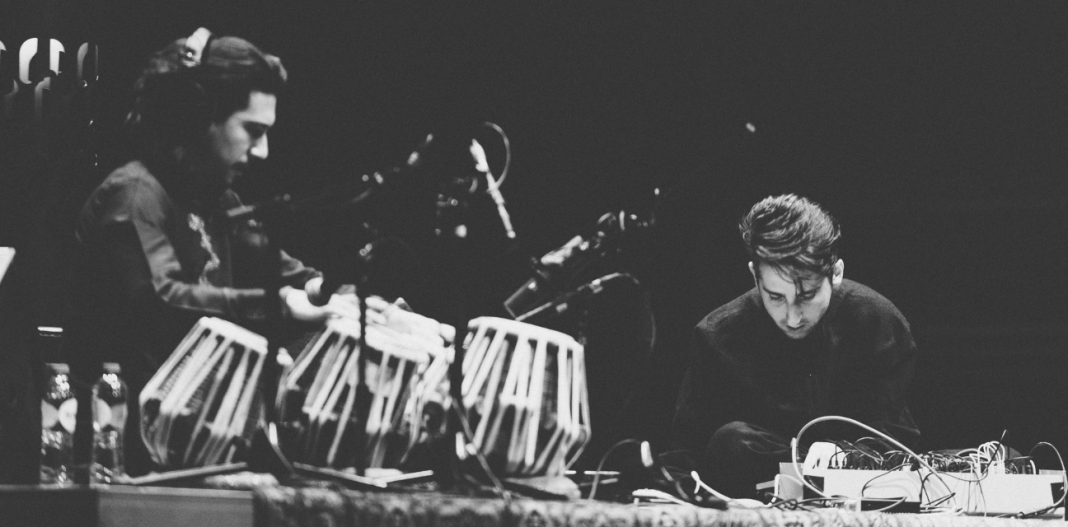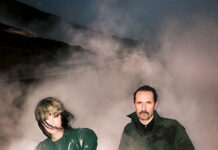Photo: Camille Blake (Camilo Tirado & James Holden)
James Holden has come a long way since the days he produced progressive house tracks in his childhood bedroom in the late nineties. After his international breakthrough in 2004 with the trance anthem “A Break In The Clouds” and his epic remix of Nathan Fake’s “The Sky Was Pink”, both released on his own label Border Community, the British musician gradually forged into the field of electronica and idiosyncratic dance music. With the advent of his third album, recorded live with a five-piece band, the 38-year-old has reached a new creative peak. In this interview, Holden walks us through the experiences – from a journey to Marrakech to live shows with a tabla player – that set the tone for The Animal Spirits.
A friend of mine once described your second album The Inheritors as ritual music from another planet. Can you relate to that?
Actually that was a big part of it, trying to make ritual music. At the time I was interested in simple folky melodies and scales and I realised all that the music I have ever really loved is repeating music. Classical music, where it’s always going off on a new bit, I often find irritating. You can’t appreciate any of the detail of what it’s doing, because you’re just holding onto the rollercoaster. So for me, it’s all about a hypnotic groove. Also, looking back, The Inheritors was sort of my Brexit record.
What do you mean?
The album was about Englishness, there’s a lot of English tonality to it. I was imagining the folk music of this island in another dimension.
That reminds me of Björk who considers her songs 21st century folk music…
Yeah, when you say the word folk, people imagine it’s going to have certain instruments in it. It’s the same with trance and jazz. But these terms are actually ways of doing things. They’re not genres of music, they are structures of music. And now that the production equipment for making dance music is so widely available, it’s like folk music. The instruments are cheap, the form is quite simple and the learning curve to get to make a tech house track is quite quick.
Does that folk theory also apply to the consumer’s experience, you think?
Sure. I grew up in the shit-bit in the middle of England. No one cool comes to play in these towns ever. Now I know the word for it, it’s Brexit. (laughs) But for my whole childhood I didn’t have that word to describe it. Like, trance was big in those provinces, and before it, heavy metal was. And both genres, they’re not fashionable in London. Right at the start of my career I played a club in Coalville, a former mining town. There’s nothing around, not even a big city. But it was a big club, and people would drive for miles to get there, thousands of people. It’s a pilgrimage, and that’s folk, isn’t it?
After The Inheritors came out, you were asked by Thom Yorke to support his band Atoms For Peace on tour. At the time you had never performed live, and yet, you agreed to do it.
When I read his email I was like, this is the best offer of my life, but how the fuck do I play live? (laughs) Luckily I had done a few shows with Caribou, I had performed with their Vibration Ensemble. I’m very grateful to Dan [Snaith] for letting me have that experience as a trial run. I went out with a modular synthesizer. Four big cases, loads of wires, and the moment the stage lights go on, it was all going out of tune.
Sounds like a nightmare.
Well, when you’re playing melodic music with a band who have got their own pitch reference, performing with a modular starts to get tricky.
How did you solve the problem?
I got a guitar tuner pedal and just jacked an oscillator into it.
Was there any other challenge you faced performing The Inheritors live?
The Inheritors was made of me just playing live in the studio. And once I got a bit I liked, I’d play live over that again. So it was full of stuff, it was too much for a computer to do live. So the main thing for me was finding this drummer, Tom Page. He was on the top of my list. Because his band, RocketNumberNine, it’s the only time I’ve gone up to a band after a gig to say, that was amazing, I’m a fan of you now. Tom travelled with Steve Reid for the last part of his life and learned a lot from that. He comes from a slightly different musical background, but we agree about everything, especially about jazz and drums.




